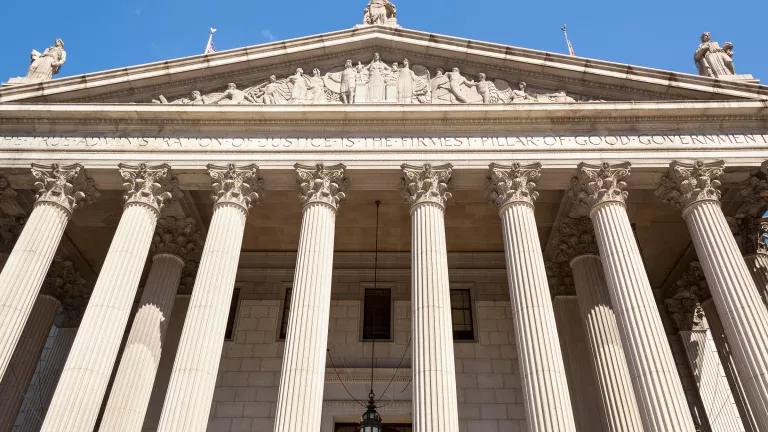Can I Participate in a Class-Action Lawsuit Against Climate Change Inaction?
NRDC senior attorney Ben Longstreth explains how plaintiffs for these cases get chosen—and how you can help advance the cause in or out of the courtroom.

Q: “There seem to be a number of class-action lawsuits against federal and state governments regarding climate change. Who can join as a plaintiff, is it helpful/advisable, and what steps need to be taken?”
―Vicente Perez
A: Litigation is one of our most formidable tools for saving the planet. Our courts hold tremendous power in ensuring that governments and regulators uphold their responsibility to act in the public’s interest.
A recent wave of lawsuits are presenting the urgent need to act on climate. A number of cases brought by coalitions of cities and counties seek damages from oil companies that are responsible for a significant portion of the carbon dioxide in our atmosphere. In these cases, the cities themselves are the ones suing, so direct citizen participation isn’t needed. For example, take a current lawsuit targeting 37 fossil fuel companies that was filed by the California counties of San Mateo and Marin in partnership with the city of Imperial Beach, where a rising sea is eroding the coastline and damaging infrastructure. The plaintiffs (the two counties and one city) are arguing that these costly impacts result directly from climate change and should be shouldered by the ones who caused it.
There are also several cases in which the plaintiffs are children—the ones who stand to lose the most. In Juliana vs. U.S., 21 young people are seeking to force the federal government to take action to address climate change. The government filed a motion to dismiss the lawsuit, but the district court rejected it and set a trial date for later this fall.
There are ways to get involved in similar legal cases, even without serving as a plaintiff. (And to clarify: Many of the cases you’re likely referring to are not technically class-action lawsuits, which require plaintiffs who represent a class of individuals and seek compensation for damages for all members of the class.) Ben Longstreth, a senior attorney in NRDC’s Climate & Clean Air program, works tirelessly in courtrooms against climate catastrophe. He notes that often, cases related to climate change inaction are coordinated by an organization, with the plaintiffs carefully selected by that group to provide varied perspectives. Plaintiffs may be chosen because they’ve felt some immediate impact of climate change already—like a flooded home or destroyed crops.
Even if your participation isn’t warranted in suits like these, Longstreth notes that there are still other ways to voice your concerns through our justice system. In every case NRDC files, our lawyers must demonstrate that NRDC members are harmed by the action they’re challenging, and that the harm will be remedied by the action they’re asking the court to take. Longstreth explains that these members serve as “standing declarants”—a fancy term for real people who can provide personal statements and real-life stories. So if you become an NRDC member, we might one day ask you if you’d be willing to stand with us in court.
The bottom line? The chance to directly join a legal battle doesn’t come up too often. But there is no shortage of opportunities to support organizations like NRDC that are fighting for the values you support. It’s also critical that we show up and participate in forums to promote climate action, whether that’s through submitting public comments, attending public hearings, or taking part in other events where we can influence policy decisions that affect our planet’s future.
However you choose to get involved, Vicente, you should feel encouraged that public pushback is reshaping the conversation around climate change accountability—and that we can win.
This NRDC.org story is available for online republication by news media outlets or nonprofits under these conditions: The writer(s) must be credited with a byline; you must note prominently that the story was originally published by NRDC.org and link to the original; the story cannot be edited (beyond simple things such as grammar); you can’t resell the story in any form or grant republishing rights to other outlets; you can’t republish our material wholesale or automatically—you need to select stories individually; you can’t republish the photos or graphics on our site without specific permission; you should drop us a note to let us know when you’ve used one of our stories.
Trump’s Anti-Environment Agenda for 2020: When Opportunism Knocks
Trump’s Pick to Lead His New Climate Change Panel Says CO2 Has Been “Demonized”
Who Is Andrew Wheeler? (And Why You Should Be Afraid of Him)